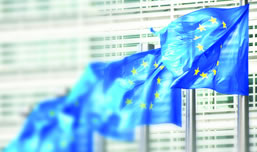Does the CJEU require single territory licensing of streamed content?
Imagine a service established in member state A which wishes to deliver on-demand streamed access to music and films to consumers in each of the other 27 member states.
Does the service need to license that service 28 times over to clear copyright in each of the states? The answer to that question has two parts: (i) in which countries is the relevant copyright (the communication to the public right) engaged; and (ii) in respect of which of those countries does the service need to be licensed? Three recent decisions of the CJEU (Pinckney1 , Football Dataco v Sportradar2 and FAPL/Karen Murphy3) have started to suggest what the answers to those questions may be.
Part 1 – in which countries is the communication to the public right engaged?
 The communication to the public right gives copyright owners the exclusive right to authorise or prohibit the making available to the public of their works in such a way that members of the public may access them from a place and at a time individually chosen by them. A service that enables online streaming of works obviously engages that right. It is not so obvious, however, that that right is engaged in every country in which the work is available. The CJEU's decision in the Football Dataco v Sportradar case (see our note here) gives the strong indication that the right will be engaged in whichever country the service intends to target. It is not the receipt of a communication that makes the act happen take place in the country of receipt; it is the fact that the service provider intends to target the country. As such, it would be possible for consumers to be able to access works in which the communication to the public right is not engaged.
The communication to the public right gives copyright owners the exclusive right to authorise or prohibit the making available to the public of their works in such a way that members of the public may access them from a place and at a time individually chosen by them. A service that enables online streaming of works obviously engages that right. It is not so obvious, however, that that right is engaged in every country in which the work is available. The CJEU's decision in the Football Dataco v Sportradar case (see our note here) gives the strong indication that the right will be engaged in whichever country the service intends to target. It is not the receipt of a communication that makes the act happen take place in the country of receipt; it is the fact that the service provider intends to target the country. As such, it would be possible for consumers to be able to access works in which the communication to the public right is not engaged.
The design of a service will determine whether or not it is targeting a particular country. If we assume that this service is available in the most commonly spoken languages in the EU, has content in each of those languages and takes payment in each currency in the EU, it is likely that it will be targeting every country.
An English court has since decided that the making available also happens in the member state from which the communication originates (see the judgment here).
If it were to operate the service with no licences at all, the courts of every member state in which the website is accessible (i.e. each of the 28 member states) is likely to have jurisdiction over the communication to the public taking place in that country: see the Pinckney case (our note is here). However, as mentioned above, just because a work is accessible in a member state does not mean that there was an intention to target the public in that member state. So, a member state that has jurisdiction over an alleged infringement because of the Pinckney decision may still, because of the Sportradar decision, find that there was no infringement in that member state because of the absence of targeting.
So that suggests that this service provider would need to obtain licences from the relevant copyright owner in each of the 28 member states, as it is all 28 member states that the communication to the public right is engaged. However, we then need to ask the second part of the question: in respect of which of those countries does the service need to be licensed?
Part 2: in respect of which of those countries does the service need to be licensed?
 The making available happens as soon as the service goes live with its intention to target the member states; there is no need for anyone in those member states actually to have accessed the work. This may mean that the service provider carries out only one act: the act of making a work available online in the source member state for simultaneous access across the EU. The fact that it crosses borders does not make it two or more acts. There could therefore be a logical conflict between saying, on the one hand, that the service provider only carries out one act (in the source member state) and saying, on the other, that that one act needs licensing 28 times. It would be like saying that a person in one member state who shoots someone in another member state could be prosecuted twice, in each member state, for that crime. It makes more logical sense for one act to need licensing only once.
The making available happens as soon as the service goes live with its intention to target the member states; there is no need for anyone in those member states actually to have accessed the work. This may mean that the service provider carries out only one act: the act of making a work available online in the source member state for simultaneous access across the EU. The fact that it crosses borders does not make it two or more acts. There could therefore be a logical conflict between saying, on the one hand, that the service provider only carries out one act (in the source member state) and saying, on the other, that that one act needs licensing 28 times. It would be like saying that a person in one member state who shoots someone in another member state could be prosecuted twice, in each member state, for that crime. It makes more logical sense for one act to need licensing only once.
How is this logical conundrum to be resolved and where does the act need licensing? The answer could be found in the CJEU's seminal decision in the FAPL/Karen Murphy case (see our note here) and in the way it resolved how the EU treaty principle of free movement of services interacts with territorial copyright law.
Having to obtain 28 licences for the same act could be considered to be a restriction on the freedom to provide services which is liable to, in the words of the CJEU, "prohibit, impede or render less advantageous the activities of a service provider established in another Member State where it lawfully provides similar services." Such restrictions can be justified if they serve the public interest, which includes protecting copyright, but only if they do not go beyond what is necessary in order to protect the "specific subject-matter" of copyright.
 In the CJEU's view, that is to obtain "appropriate remuneration for each use" of the copyright, which is determined by the economic value of the service provided (e.g. how many people enjoy the service). Copyright does not give rights holders the right to obtain "the highest possible remuneration". That appropriate remuneration can be obtained through a single licence which takes into account the actual and potential audiences in all member states in which the service is received (e.g. by reference to the number of people who buy access to a service).
In the CJEU's view, that is to obtain "appropriate remuneration for each use" of the copyright, which is determined by the economic value of the service provided (e.g. how many people enjoy the service). Copyright does not give rights holders the right to obtain "the highest possible remuneration". That appropriate remuneration can be obtained through a single licence which takes into account the actual and potential audiences in all member states in which the service is received (e.g. by reference to the number of people who buy access to a service).
This reasoning suggests that multiple licences for the single act of communication to the public are not needed, as "appropriate remuneration" could be earned through a single licence. The CJEU could, therefore, extend this decision to online exploitation and find that multiple licensing (and multiple charging) for the same online use is incompatible with the EU treaty4, particularly when the same use within only one member state would need only one licence.
The reasoning in this case might not, however, apply equally to the making available right. In the FAPL case, the court was considering an act of broadcasting which the relevant legislation provides takes place only at source (i.e. not also at destination). There was therefore no basis in copyright law which could justify requiring a further authorisation at destination. As discussed above, the making available right can be engaged at destination (when targeted there) as well as source so, in principle, multiple authorisations could be required. In practice, the right could be owned by different entities in each territory and the effect of the CJEU's reasoning would be that only one entity would, in effect, be licensing all of their rights. Further, the right might not even need licensing at source although it would need licensing at destination (for example because of an exception applying at source but not at destination). This all suggests that different considerations could apply to the making available right. The policy behind the CJEU's decision was, however, clearly in favour of facilitating cross-border access to content and not allowing copyright unnecessarily to impede that access.
 The European Commission will, on 13 November 2013, receive the results of its year-long "Licences for Europe" stakeholder dialogue and the practical solutions that have been identified. If these do not satisfy the Commission's objective of fostering cross-border on-line access, it may go on to recommend new legislation in this area. It will be interesting to see whether legislation which brings about this result is proposed. If not, it may fall to the CJEU, with all the interpretative uncertainties that that will bring.
The European Commission will, on 13 November 2013, receive the results of its year-long "Licences for Europe" stakeholder dialogue and the practical solutions that have been identified. If these do not satisfy the Commission's objective of fostering cross-border on-line access, it may go on to recommend new legislation in this area. It will be interesting to see whether legislation which brings about this result is proposed. If not, it may fall to the CJEU, with all the interpretative uncertainties that that will bring.
If you have any questions on this article please contact us.


Adam Rendle
Adam Rendle reviews recent CJEU case law and what it means for the cross-border delivery of online content.
"The European Commission will, on 13 November 2013, receive the results of its year-long 'Licences for Europe' stakeholder dialogue and the practical solutions that have been identified."

